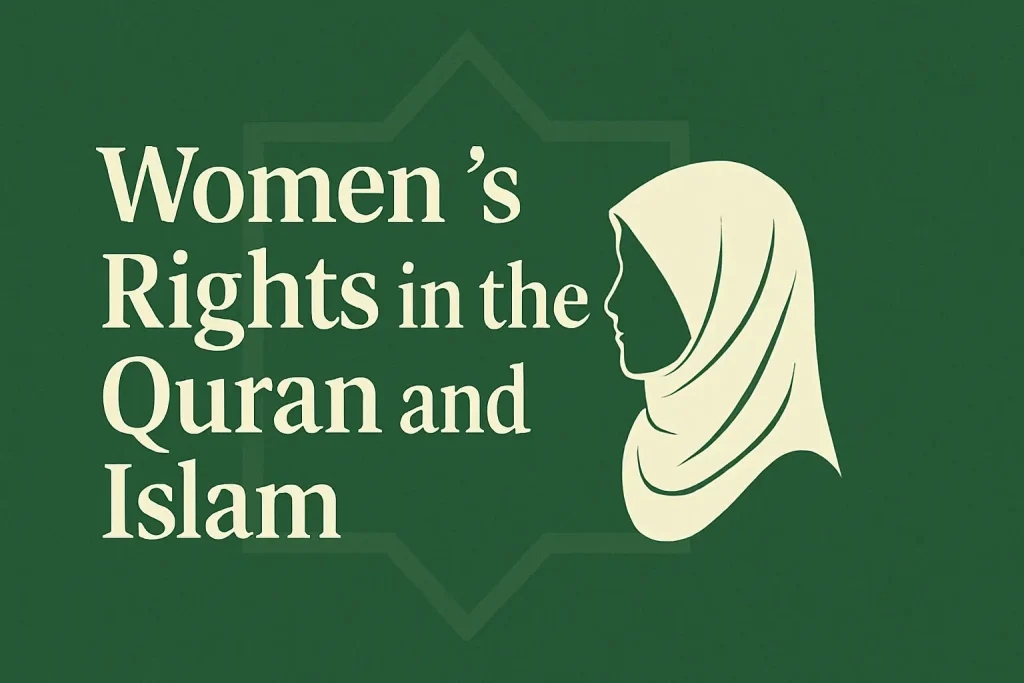Women’s rights have always been an important and widely discussed topic in both Muslim and non-Muslim communities. People have different opinions on the matter, but the most fair and complete view is found in Islam. Some believe that Islam oppresses women and gives more importance to men, but this is a misunderstanding. In reality, Islam honours women and gives them their rights with respect and justice. More than 1400 years ago, Islam explained these rights clearly—covering everything from small daily matters to major issues—without leaving anything out.
In this article, we will explore all the rights of women in Islam in detail, supported by proper references from the Quran and Hadith of the Prophet Muhammad ﷺ.
1. Spiritual Equality of Men and Women
Men and women are spiritually equal in the eyes of Allah. Islam does not suppress women or deny them their rights. Instead, it treats men and women equally in many aspects of life and promises them equal rewards for their good deeds. As the Qur’an says:
“Indeed, the men who submit and the women who submit, the believing men and the believing women… Allah has prepared for them forgiveness and a great reward.” — (Surah Al-Ahzab 33:35)
The purpose of mentioning men and women together is evidence that Islam emphasises both equally, regardless of gender, and also makes it clear that both will be rewarded equally for their good and bad deeds on the Day of Judgment.
2. Right of Education
Islam emphasises the importance of seeking knowledge for both men and women without any distinction based on gender. Men and women are given equal opportunities in every field of life to pursue education. The Messenger of Allah clearly stated that seeking knowledge is mandatory for every Muslim, both male and female.
“Seeking knowledge is an obligation upon every Muslim (Men and Women).” — (Sunan Ibn Majah, Hadith 224)
3. Right of Property and Wealth
Before Islam, during the Dark Ages, women were deprived of their right to own property and had no control over it. However, when Islam came, it granted women the full right to own, inherit, and manage property independently. Islam gives women a rightful share in the wealth of their parents and husbands.
“For men is a share of what the parents and close relatives leave, and for women is a share of what the parents and close relatives leave…” — (Surah An-Nisa, 4:7)
4. Women’s Right of Marriage
Islam grants women the complete right to choose their spouse. They have the freedom to accept or reject marriage proposals and can marry a man of their own choice based on compatibility, character, and faith—without being forced by their families or relatives.
“And among His signs is that He created for you from yourselves mates that you may find tranquility in them…”
— (Surah Ar-Rum, 30:21)
Forced marriage is not a teaching of Islam but rather a cultural innovation (bid’ah) that has no basis in the Quran or Hadith. Women should be given the right to choose their life partner, as they are the ones who have to live with them—not their relatives or parents.
5. Prohibition of Abuse and Violence
Islam strictly forbids hitting or abusing women and commands that they be treated with kindness and respect. Women are considered a delicate creation, and Islam teaches that they should be dealt with gently and compassionately. Any form of injustice or oppression against them is clearly prohibited.
“The best among you are those who are best to their families, and I am the best among you in treating my family.”
— (Tirmidhi, Hadith 3895)
6. Women’s right as the mother
A mother’s relationship is the most sacred and purest bond in this world. Islam has honoured women by granting them the revered role of being a mother. Islam has elevated the status of mothers to such an extent that Paradise is placed beneath their feet. What greater importance could there be for a mother and woman than the fact that Paradise lies under her feet?
A man asked the Prophet ﷺ, “Who is most deserving of my good company?” He replied, “Your mother.” He asked, “Then who?” The Prophet replied, “Your mother.” He asked again, “Then who?” The Prophet replied, “Your mother.” Then he asked, “Then who?” The Prophet replied, “Your father.”
(Sahih Bukhari, Hadith 5971)
This Hadith beautifully illustrates the unparalleled rights and respect a mother (woman) deserves in Islam.
7. The Right to Work and Participate in Society
Islam has given women the right to work and do business, provided they observe modesty and maintain appropriate covering. They are encouraged to play an active role in the well-being of society. During the Prophet’s time, women were scholars, entrepreneurs, and even soldiers. Islam recognises their talents and contributions.
“And the believing men and believing women are allies of one another. They enjoin what is right and forbid what is wrong…”
(Surah At-Tawbah, 9:71)
Therefore, women should be given proper opportunities in every field so they can also contribute as active and valuable members of society.
Conclusion
The women’s rights in the Quran and the female rights in Islam reflect a system built on justice, equity, and compassion. Whether in matters of spirituality, education, finance, marriage, or social roles, Islam has laid down a framework that uplifts and empowers women.
Understanding the difference between cultural practices and authentic Islamic teachings is essential. Islam, through the Quran and Sunnah, has been a pioneer in establishing women’s rights long before modern systems even acknowledged them.

